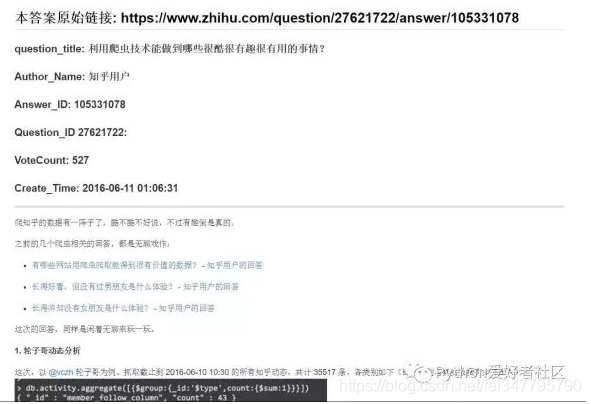前期准备
- python2.7
- html2text
- markdownpad(这里随意,只要可以支持md就行)
- 会抓包
- 最重要的是你要有代理,因为知乎开始封IP了
原理
原理说起来很简单:获取请求到的内容的BODY部分,然后重新构建一个HTML文件,接着利用html2text这个模块将其转换为markdown文件,最后对图片及标题按照markdown的格式做一些处理就好了。目前应用的场景主要是在知乎。
代码实现
获取知乎答案
写代码的时候,主要考虑了两种使用场景。第一,获取某一特定答案的数据然后进行转换;第二,获取某一个问题的所有答案进行然后挨个进行转换,在这里可以 通过赞同数来对要获取的答案进行质量控制。
某一个特定答案的数据获取
url:https://www.zhihu.com/question/27621722/answer/48658220
'''
(前面那个是问题ID,后边的是答案ID)
'''
这一数据的获取我这里分为了两个部分,第一部分请求上述网址,拿到答案主体数据以及赞同数,第二部分请求下面这个接口:
https://www.zhihu.com/api/v4/answers/48658220
为什么会这样?因为这个接口得到的答案正文数据不是完整数据,所以只能分两步了。
某一个特定答案的数据获取
这一个数据就可以通过很简单的方式得到了,接口如下:
https://www.zhihu.com/api/v4/questions/27621722/answers?sort_by=default&include=data%5B%2A%5D.is_normal%2Cis_collapsed%2Ccollapse_reason%2Cis_sticky%2Ccollapsed_by%2Csuggest_edit%2Ccomment_count%2Ccan_comment%2Ccontent%2Ceditable_content%2Cvoteup_count%2Creshipment_settings%2Ccomment_permission%2Cmark_infos%2Ccreated_time%2Cupdated_time%2Crelationship.is_authorized%2Cis_author%2Cvoting%2Cis_thanked%2Cis_nothelp%2Cupvoted_followees%3Bdata%5B%2A%5D.author.follower_count%2Cbadge%5B%3F%28type%3Dbest_answerer%29%5D.topics&limit=20&offset=3
返回的都是JSON数据,很方便获取。但是这里有一个地方需要注意,从这里面取的答案正文数据就是文本数据,不是一个完整的html文件,所以需要在构造一下。
保存的字段
- author_name 回答用户名
- answer_id 答案ID
- question_id 问题ID
- question_title 问题
- vote_up_count 赞同数
- create_time 创建时间
- 答案主体
主脚本:zhihu.py
import os
import re
import json
import requests
import html2text
from parse_content import parse
'''
更多Python学习资料以及源码教程资料,可以在群1136201545免费获取
'''
"""
just for study and fun
Talk is cheap
show me your code
"""
class ZhiHu(object):
def __init__(self):
self.request_content = None
def request(self, url, retry_times=10):
header = {
'User-Agent': 'Mozilla/5.0 (X11; Linux x86_64) AppleWebKit/537.36 (KHTML, like Gecko) Chrome/57.0.2987.133 Safari/537.36',
'authorization': 'oauth c3cef7c66a1843f8b3a9e6a1e3160e20',
'Host': 'www.zhihu.com'
}
times = 0
while retry_times>0:
times += 1
print 'request %s, times: %d' %(url, times)
try:
ip = 'your proxy ip'
if ip:
proxy = {
'http': 'http://%s' % ip,
'https': 'http://%s' % ip
}
self.request_content = requests.get(url, headers=header, proxies=proxy, timeout=10).content
except Exception, e:
print e
retry_times -= 1
else:
return self.request_content
def get_all_answer_content(self, question_id, flag=2):
first_url_format = 'https://www.zhihu.com/api/v4/questions/{}/answers?sort_by=default&include=data%5B%2A%5D.is_normal%2Cis_collapsed%2Ccollapse_reason%2Cis_sticky%2Ccollapsed_by%2Csuggest_edit%2Ccomment_count%2Ccan_comment%2Ccontent%2Ceditable_content%2Cvoteup_count%2Creshipment_settings%2Ccomment_permission%2Cmark_infos%2Ccreated_time%2Cupdated_time%2Crelationship.is_authorized%2Cis_author%2Cvoting%2Cis_thanked%2Cis_nothelp%2Cupvoted_followees%3Bdata%5B%2A%5D.author.follower_count%2Cbadge%5B%3F%28type%3Dbest_answerer%29%5D.topics&limit=20&offset=3'
first_url = first_url_format.format(question_id)
response = self.request(first_url)
if response:
contents = json.loads(response)
print contents.get('paging').get('is_end')
while not contents.get('paging').get('is_end'):
for content in contents.get('data'):
self.parse_content(content, flag)
next_page_url = contents.get('paging').get('next').replace('http', 'https')
contents = json.loads(self.request(next_page_url))
else:
raise ValueError('request failed, quit......')
def get_single_answer_content(self, answer_url, flag=1):
all_content = {}
question_id, answer_id = re.findall('https://www.zhihu.com/question/(\d+)/answer/(\d+)', answer_url)[0]
html_content = self.request(answer_url)
if html_content:
all_content['main_content'] = html_content
else:
raise ValueError('request failed, quit......')
ajax_answer_url = 'https://www.zhihu.com/api/v4/answers/{}'.format(answer_id)
ajax_content = self.request(ajax_answer_url)
if ajax_content:
all_content['ajax_content'] = json.loads(ajax_content)
else:
raise ValueError('request failed, quit......')
self.parse_content(all_content, flag, )
def parse_content(self, content, flag=None):
data = parse(content, flag)
self.transform_to_markdown(data)
def transform_to_markdown(self, data):
content = data['content']
author_name = data['author_name']
answer_id = data['answer_id']
question_id = data['question_id']
question_title = data['question_title']
vote_up_count = data['vote_up_count']
create_time = data['create_time']
file_name = u'%s--%s的回答[%d].md' % (question_title, author_name,answer_id)
folder_name = u'%s' % (question_title)
if not os.path.exists(os.path.join(os.getcwd(),folder_name)):
os.mkdir(folder_name)
os.chdir(folder_name)
f = open(file_name, "wt")
f.write("-" * 40 + "\n")
origin_url = 'https://www.zhihu.com/question/{}/answer/{}'.format(question_id, answer_id)
f.write("## 本答案原始链接: " + origin_url + "\n")
f.write("### question_title: " + question_title.encode('utf-8') + "\n")
f.write("### Author_Name: " + author_name.encode('utf-8') + "\n")
f.write("### Answer_ID: %d" % answer_id + "\n")
f.write("### Question_ID %d: " % question_id + "\n")
f.write("### VoteCount: %s" % vote_up_count + "\n")
f.write("### Create_Time: " + create_time + "\n")
f.write("-" * 40 + "\n")
text = html2text.html2text(content.decode('utf-8')).encode("utf-8")
# 标题
r = re.findall(r'\*\*(.*?)\*\*', text, re.S)
for i in r:
if i != " ":
text = text.replace(i, i.strip())
r = re.findall(r'_(.*)_', text)
for i in r:
if i != " ":
text = text.replace(i, i.strip())
text = text.replace('_ _', '')
# 图片
r = re.findall(r'!\[\]\((?:.*?)\)', text)
for i in r:
text = text.replace(i, i + "\n\n")
f.write(text)
f.close()
if __name__ == '__main__':
zhihu = ZhiHu()
url = 'https://www.zhihu.com/question/27621722/answer/105331078'
zhihu.get_single_answer_content(url)
# question_id = '27621722'
# zhihu.get_all_answer_content(question_id)
zhihu.py为主脚本,内容很简单,发起请求,调用解析函数进行解析,最后再进行保存。
解析函数脚本:parse_content.py
import time
from bs4 import BeautifulSoup
'''
更多Python学习资料以及源码教程资料,可以在群1136201545免费获取
'''
def html_template(data):
# api content
html = '''
<html>
<head>
<body>
%s
</body>
</head>
</html>
''' % data
return html
def parse(content, flag=None):
data = {}
if flag == 1:
# single
main_content = content.get('main_content')
ajax_content = content.get('ajax_content')
soup = BeautifulSoup(main_content.decode("utf-8"), "lxml")
answer = soup.find("span", class_="RichText CopyrightRichText-richText")
author_name = ajax_content.get('author').get('name')
answer_id = ajax_content.get('id')
question_id = ajax_content.get('question').get('id')
question_title = ajax_content.get('question').get('title')
vote_up_count = soup.find("meta", itemprop="upvoteCount")["content"]
create_time = time.strftime("%Y-%m-%d %H:%M:%S", time.localtime(ajax_content.get('created_time')))
else:
# all
answer_content = content.get('content')
author_name = content.get('author').get('name')
answer_id = content.get('id')
question_id = content.get('question').get('id')
question_title = content.get('question').get('title')
vote_up_count = content.get('voteup_count')
create_time = time.strftime("%Y-%m-%d %H:%M:%S", time.localtime(content.get('created_time')))
content = html_template(answer_content)
soup = BeautifulSoup(content, 'lxml')
answer = soup.find("body")
print author_name,answer_id,question_id,question_title,vote_up_count,create_time
# 这里非原创,看了别人的代码,修改了一下
soup.body.extract()
soup.head.insert_after(soup.new_tag("body", **{'class': 'zhi'}))
soup.body.append(answer)
img_list = soup.find_all("img", class_="content_image lazy")
for img in img_list:
img["src"] = img["data-actualsrc"]
img_list = soup.find_all("img", class_="origin_image zh-lightbox-thumb lazy")
for img in img_list:
img["src"] = img["data-actualsrc"]
noscript_list = soup.find_all("noscript")
for noscript in noscript_list:
noscript.extract()
data['content'] = soup
data['author_name'] = author_name
data['answer_id'] = answer_id
data['question_id'] = question_id
data['question_title'] = question_title
data['vote_up_count'] = vote_up_count
data['create_time'] = create_time
return data
parse_content.py主要负责构造新的html,然后对其进行解析,获取数据。
测试结果展示


一定要联网!
一定要联网!
一定要联网!